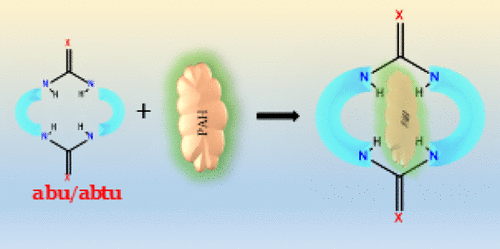当前位置:
X-MOL 学术
›
J. Chem. Inf. Model.
›
论文详情
Our official English website, www.x-mol.net, welcomes your
feedback! (Note: you will need to create a separate account there.)
Computational Study of Encapsulation of Polyaromatic Hydrocarbons by Endo-Functionalized Receptors in Nonpolar Medium.
Journal of Chemical Information and Modeling ( IF 5.6 ) Pub Date : 2020-01-10 , DOI: 10.1021/acs.jcim.9b00799 Rabindranath Paul 1 , Sandip Paul 1
Journal of Chemical Information and Modeling ( IF 5.6 ) Pub Date : 2020-01-10 , DOI: 10.1021/acs.jcim.9b00799 Rabindranath Paul 1 , Sandip Paul 1
Affiliation

|
Polycyclic aromatic hydrocarbons (PAHs) constitute a large group of organic pollutants produced from either natural or artificial sources during the incomplete combustion of fossil fuels or derived from various industrial processes (such as refinery processes of crude petroleum). They are seriously hazardous to human health, and removing them is of major importance. The complexation likeliness with and selective recognition of PAH guests by endo-functionalized molecular tube hosts (host-abu and host-abtu) in a nonpolar medium are investigated using classical molecular dynamics simulation and quantum calculation to probe the factors and the molecular mechanism involved in complexation processes. We examine the role of different guest molecules in the structural changes of hosts, a prelude to van der Waals interactions and binding free energy in the complexation process. These types of host-guest interactions depend on various factors. We find that (i) both the host molecules (host-abtu and host-abu) interact with the guest π-electron cloud almost equally and (ii) these interactions also depend on the molecular size of PAHs. The larger the nonpolar surface area of PAHs, the greater the interactions with the host, and the more extensive the π-electron cloud of the guest, the stronger the interactions. The linear PAHs interact more strongly than isomeric branched/curved PAHs, and the presence of heteroatoms on PAHs decreases the interactions with the host by creating repulsion between the lone pairs of heteroatoms and the π-electron cloud of the host. Noncovalent van der Waals interactions and N-H···π interactions dominate the high affinities of PAHs toward host-abu and host-abtu. The potential of mean force and molecular mechanics Poisson-Boltzmann surface area calculations reveal that all host-guest complexes are energetically stable.
中文翻译:

非极性介质中内官能化受体包裹聚芳烃的计算研究。
多环芳烃(PAHs)构成了一大堆有机污染物,这些矿物污染物是在化石燃料不完全燃烧期间从自然或人工来源产生的,或者是从各种工业过程(如原油的精炼过程)衍生而来的。它们严重危害人类健康,因此将其清除至关重要。使用经典分子动力学模拟和量子计算方法研究了非极性介质中内官能化分子管宿主(宿主-abu和宿主-abtu)与PAH客体的络合可能性和选择性识别,探讨了参与其中的因素和分子机理复杂化过程。我们研究了不同客体分子在宿主结构变化中的作用,范德华相互作用和络合过程中结合自由能的序幕。这些类型的主机与访客之间的交互取决于各种因素。我们发现(i)两种宿主分子(host-abtu和host-abu)几乎与客体π电子云相互作用,并且(ii)这些相互作用还取决于PAHs的分子大小。PAHs的非极性表面积越大,与主体的相互作用就越大,并且客体的π电子云越广泛,则相互作用越强。线性多环芳烃比异构的支链/弯曲多环芳烃具有更强的相互作用,多环芳烃上杂原子的存在通过在杂原子的孤对与主体的π电子云之间产生排斥力而降低了与主体之间的相互作用。非共价范德华相互作用和NH···π相互作用主导着PAH对寄主-阿布和寄主-abtu的高亲和力。平均力和分子力学泊松-玻尔兹曼表面积计算的潜力表明,所有主体-客体复合体在能量上都是稳定的。
更新日期:2020-01-10
中文翻译:

非极性介质中内官能化受体包裹聚芳烃的计算研究。
多环芳烃(PAHs)构成了一大堆有机污染物,这些矿物污染物是在化石燃料不完全燃烧期间从自然或人工来源产生的,或者是从各种工业过程(如原油的精炼过程)衍生而来的。它们严重危害人类健康,因此将其清除至关重要。使用经典分子动力学模拟和量子计算方法研究了非极性介质中内官能化分子管宿主(宿主-abu和宿主-abtu)与PAH客体的络合可能性和选择性识别,探讨了参与其中的因素和分子机理复杂化过程。我们研究了不同客体分子在宿主结构变化中的作用,范德华相互作用和络合过程中结合自由能的序幕。这些类型的主机与访客之间的交互取决于各种因素。我们发现(i)两种宿主分子(host-abtu和host-abu)几乎与客体π电子云相互作用,并且(ii)这些相互作用还取决于PAHs的分子大小。PAHs的非极性表面积越大,与主体的相互作用就越大,并且客体的π电子云越广泛,则相互作用越强。线性多环芳烃比异构的支链/弯曲多环芳烃具有更强的相互作用,多环芳烃上杂原子的存在通过在杂原子的孤对与主体的π电子云之间产生排斥力而降低了与主体之间的相互作用。非共价范德华相互作用和NH···π相互作用主导着PAH对寄主-阿布和寄主-abtu的高亲和力。平均力和分子力学泊松-玻尔兹曼表面积计算的潜力表明,所有主体-客体复合体在能量上都是稳定的。











































 京公网安备 11010802027423号
京公网安备 11010802027423号